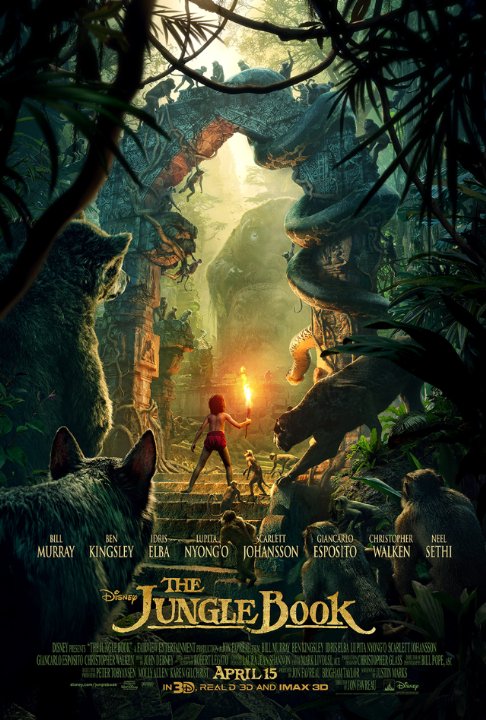‘The Jungle Book’ Rousing, Beautiful
Somewhere, at some point, someone at Disney said, “Do you know what we should do, instead of making endless sequels to classic Disney films, as if no one in the company has had an original thoughts since 1997? Remakes. Remakes of classic Disney films. In live-action.”
This was a bad idea. It should not have worked. But it has twice – first with Cinderella, released last year, and now with The Jungle Book, in theaters now. A famous story holds that Walt Disney, when rallying his team to make the animated  version, held up a copy of The Jungle Book and said, “The first thing I want you to do is not read it.”
version, held up a copy of The Jungle Book and said, “The first thing I want you to do is not read it.”
The makers of the live-action version have read the book, and more of Kipling besides. They include Kipling’s jungle creation-myth and even quote his poetry: “This is the Law of the Jungle, as old and as true as the sky …”
This is, in fact, the great advantage to remaking movies like Cinderella and The Jungle Book, as opposed to remaking (for example) Star Trek. If you want to remake Star Trek, your raw material is limited to, well, Star Trek. But if you want to remake Disney’s Cinderella, your raw material reaches back to Perrault’s Cinderella, and the Grimm Brothers’ Cinderella, and the whole web of Cinderella-like stories that vein the world’s folklore. In the same way, if you want to remake Disney’s Jungle Book, you can look for material also in Kipling’s Jungle Book, and in all of Kipling’s jungle myths and poetry.
Many different silver-screen interpretations of The Jungle Book were always possible. Disney has now created two of them. The live-action Jungle Book follows the general plot of its predecessor – which, considering how little plot that had, is not very constrictive. It even includes, in desultory fashion, inferior renditions of “Bare Necessities” and “I Wanna Be Like You”, as if Disney just felt obligated.
But in tone and in spirit, the new Jungle Book is a revolution. It gives up the fun that ruled the animated version for danger, beauty, and – most surprisingly – grandeur. Much of the grandeur, like much of the beauty, comes simply from the jungle setting, gorgeously realized in a way that the original film could not have even aspired to. There is grandeur, too, in the elephants and the reverence paid to them by all other animals.
One of the greatest accomplishments of this film is the sense it creates of the jungle as an ancient and ordered society, with its own laws, traditions, and even prejudices. There is, in the animals, a confidence in who they are, who others are, and what everyone’s place is. Shere Kahn is so fearsome because of his lawlessness, because he can’t be counted on to stay in his preordained place.
Most unexpectedly, The Jungle Book makes a major theme of how different Mowgli is from the animals that surround him. His human inventiveness, and inventions, befuddle and anger the animals by turn. Bagheera, solemnly commanding Mowgli to bow to elephants passing by them, tells him, “The elephants created this jungle. They made all that belongs: the mountains, the trees, the birds in the trees. But they did not make you.” In the climax, of course, Mowgli defeats the tiger with “Man’s Red Flower”, which the animals cannot control and deeply fear.
The film never suggests the Bible’s vision of Man as the image of God, created preeminent over all the beasts. It does, however, get so far as G. K. Chesterton’s dictum: “Man is an exception, whatever else he is.” In our society, where people are outraged when a gorilla is killed to protect a child, even that is a refreshing breath of sanity.
Disney’s live-action The Jungle Book digs deeper than its animated predecessor both into Rudyard Kipling’s works and into the grand possibilities of film. The result is a rousing, beautiful film with a surprising measure of grandeur and of meaning.





























I hesitate to call it live-action when it’s 90% CG. Also, I’m still not convinced that this remake needs to exist. If we wanted a more profound version of the story of Man and Nature, there are a lot better ways to go about it than ol’ Kippy and his being up to his armpits in imperialism. And “Princess Mononoke” did it better.
Needs to exist is rather a high bar for a movie. Hollywood would go out of business.
As for Kipling’s imperialism – so what? Disney’s Jungle Book isn’t imperialistic, nor is it contaminated because it was inspired by a book that was written by a man who had imperialist views. Throwing out an entire collection of works because its author had impure opinions is the most tiresome form of censorship.
It’s not censorship to want to find better ways to tell stories.
And there’s not any real way to get around the fact that what Kippy was doing what deciding which parts of a brown-people culture were acceptable to white people and thus would be allowed to continue. It’s not like the Grimms, who editorialized stories from their own culture. And I give some of the Just So Stories a bit of a pass because they don’t really occur in a “real” place. But Jungle Book was written about Indian people, and I doubt it has much to do with how they see the world. Do we have white ideas about hierarchy and order, or Indian ideas about hierarchy/order?